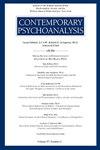Who Can Afford Complexity? The Promise and Peril of Psychoanalyzing the Abortion Decision
IF 0.2
4区 心理学
Q4 PSYCHIATRY
引用次数: 1
Abstract
AbstractThis paper situates psychoanalytic exploration of abortion within a politically polarized culture, in which claims of psychological and moral hazard are weaponized to undermine women’s reproductive freedom. Reflecting on these political perils and building on Sullivan’s notion of consensually validated experience as central to reflective functioning, the author locates psychoanalytic silence around abortion as part of a broader socio-cultural disavowal. Without a framework in which to describe the abortion decision as an ethical choice, rooted in a sense of responsibility for self and other, dissociation of these complex dimensions becomes a tool of political expediency. Yet the costs of splitting off the ethical and psychological complexities of the abortion decision are significant: Little support is provided to women faced with this decision, and conversations about ethical complexities are shut-down, creating a void that has been filled by the anti-abortion movement. The urgent question for psychoanalysts is: How do we help women formulate abortion narratives – including the healing, traumatic, and ethical dimensions – when the cultural debate around not just abortion but women’s decision-making power, generally, precludes such complexities? This is a question that has implications far beyond the consulting room: Listening to women on their own terms is crucial if we are ever to build a socio-legal framework that better reflects and protects their lived experience.Keywords: Consensually validatedabortiondissociationreproductive agencypoliticalThis article is part of a series including: Additional informationNotes on contributorsNaomi SniderNaomi Snider, LL.M., LP, is a practicing psychoanalyst and graduate of the William Alanson White Institute of Psychiatry, Psychoanalysis & Psychology, where she currently serves as President of the Psychoanalytic Society. Her published works include the 2018 book, Why Does Patriarchy Persist?, coauthored with Carol Gilligan, and the co-edited volume (with J. Petrucelli and S. Schoen), Patriarchy and its Discontent: Psychoanalytic Perspective (2022). She is currently part of a research team from NYU’s Radical Listening Project that – in collaboration with three girls’ schools – is investigating how to help girls develop the skills they need to resist pressures to self-silence, in the name of inclusion and success.谁能负担得起复杂性?对堕胎决定进行精神分析的希望与危险
摘要本文将精神分析对堕胎的探索置于政治两极化的文化中,在这种文化中,心理和道德风险的主张被当作武器来破坏妇女的生育自由。考虑到这些政治风险,并以沙利文的“经双方同意确认的经验是反思功能的核心”这一概念为基础,作者将精神分析学家对堕胎的沉默定位为更广泛的社会文化否认的一部分。如果没有一个框架来将堕胎决定描述为一种道德选择,这种选择植根于对自我和他人的责任感,那么这些复杂维度的分离就会成为政治权宜之计的工具。然而,将堕胎决定的伦理和心理复杂性分离开来的代价是巨大的:面对这一决定的女性几乎得不到支持,关于伦理复杂性的对话也被关闭,造成了一个被反堕胎运动填补的空白。精神分析学家面临的紧迫问题是:当围绕堕胎和女性决策权的文化辩论普遍排除了这种复杂性时,我们如何帮助女性制定堕胎叙事——包括治疗、创伤和道德层面?这个问题的影响远远超出了咨询室:如果我们要建立一个更好地反映和保护妇女生活经验的社会法律框架,倾听妇女自己的意见是至关重要的。关键词:双方同意确认堕胎分离生殖机构政治这篇文章是一系列文章的一部分,包括:附加信息撰稿人说明naomi Snider naomi Snider,法学硕士,LP,是一名执业精神分析学家,毕业于William Alanson White精神病学,精神分析和心理学研究所,目前担任精神分析学会主席。她的出版作品包括2018年出版的《父权制为何持续存在?》,与Carol Gilligan合著,并与J. Petrucelli和S. Schoen合编了《父权制及其不满:精神分析的视角》(2022)。她目前是纽约大学激进倾听项目研究小组的一员,该项目与三所女子学校合作,正在研究如何帮助女孩发展她们所需的技能,以包容和成功的名义抵制自我沉默的压力。
本文章由计算机程序翻译,如有差异,请以英文原文为准。
求助全文
约1分钟内获得全文
求助全文

 求助内容:
求助内容: 应助结果提醒方式:
应助结果提醒方式:


